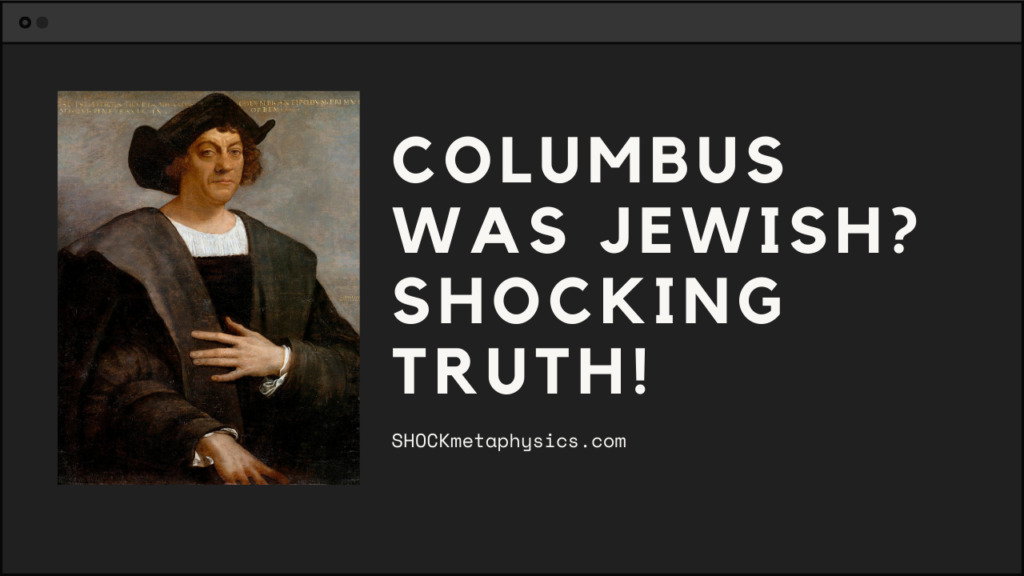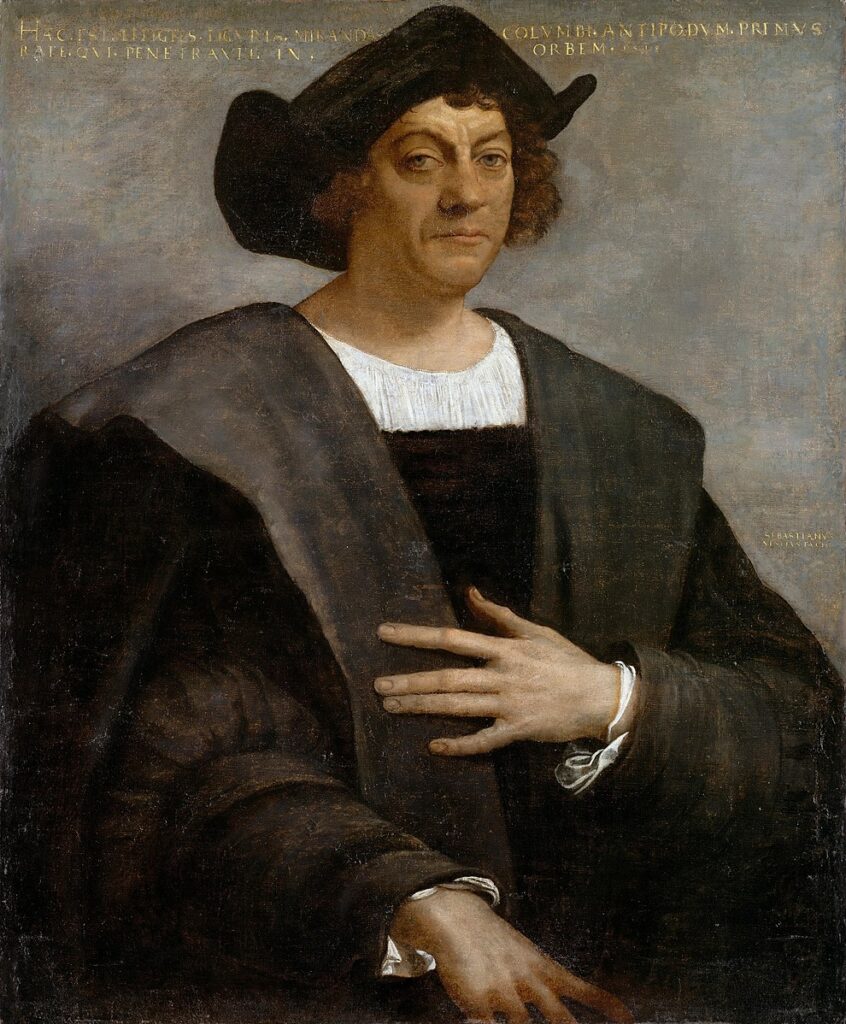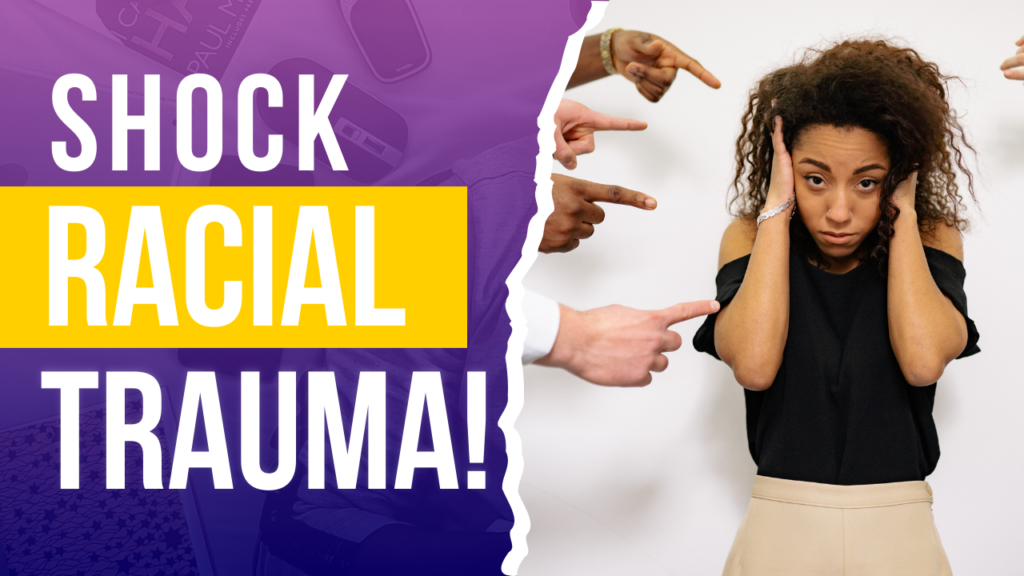
Powered By BlackTraumaGPT.com
Researched and Curated By Rev. Dr. Philippe SHOCK Matthews
(Black Trauma and Mental Health Specialist | Prompt Eng | GPT Dev | Research Scientist | Africana Phenomenologist | Black AI Corsortim co-Founder | Black Mental Health Podcast Host)

Recent DNA evidence has shed new light on the origins of Christopher Columbus, suggesting that the famed explorer may have had Sephardic Jewish ancestry. This revelation challenges the long-held belief that Columbus was Italian, born in Genoa in 1451.
Key Findings
Spanish researchers, led by Professor José Antonio Lorente from the University of Granada, conducted a 22-year DNA study on remains believed to be those of Columbus, his son Hernando, and his brother Diego[1][2]. The study revealed genetic traits compatible with Jewish origins, particularly in the Y chromosome and mitochondrial DNA[1][2].
Possible Origins
While the exact birthplace of Columbus remains uncertain, the research suggests he was likely from Western Europe, with Valencia, Spain emerging as a strong possibility[1]. This contradicts the traditional narrative of Columbus being from Genoa, Italy.
Historical Context
The findings align with the historical context of 15th-century Spain:
- An estimated 300,000 Jews were living in Spain before the era of the “Reyes Catolicos”[3].
- In 1492, the same year as Columbus’s first voyage, Spanish monarchs ordered Jews and Muslims to convert to Christianity or face exile[3].
Given this context, researchers believe Columbus may have either concealed his Jewish identity or converted to Catholicism to escape religious persecution[1][3].
Scientific Caution
It’s important to note that while the DNA evidence is compelling, some experts urge caution:
- The research has not yet been published in a peer-reviewed scientific journal[4].
- DNA analysis alone cannot definitively determine someone’s religion or nationality, which are social constructs[4].
- Genetic tests can only link a person’s DNA to populations known to have lived in certain regions at specific times[4].
Implications
If confirmed, this discovery could reshape our understanding of Columbus’s personal history and legacy. However, some Jewish scholars are reluctant to embrace Columbus as Jewish, citing concerns about potential antisemitism and the explorer’s controversial role in colonization[5].
While this new evidence offers intriguing insights into Columbus’s background, further research and peer review will be necessary to validate these findings and their implications for historical understanding fully.
Citations:
[3] https://www.independent.co.uk/life-style/christopher-columbus-dna-sephardic-jew-b2630798.html
[4] https://www.dw.com/en/columbus-stays-italian-until-spanish-scientists-publish-data/a-70513162
[5] https://www.trtworld.com/magazine/why-jews-dont-want-christopher-columbus-to-be-identified-as-jewish-18221397 [6] https://www.bbc.com/news/articles/ckg2049ezpko
[7] https://forward.com/culture/663781/christopher-columbus-jewish-dna-spanish-documentary-inquisition/ [8] https://www.jns.org/experts-advise-caution-about-report-christopher-columbus-was-jewish/
How Did Columbus Manage To Conceal His Jewish Heritage?

Christopher Columbus likely employed several strategies to conceal his Jewish heritage:
Social and Religious Practices
Columbus outwardly presented himself as a devout Roman Catholic[5]. He:
- Filled his ship logs with references to Jesus and Catholic holy days
- Lived openly as a proud Roman Catholic
- Secured support from Spain’s Catholic monarchs, Queen Isabella I and King Ferdinand II, for his expeditions[4]
This public display of Catholic devotion would have helped deflect suspicion about his true background.
Name Change
Columbus may have changed his name to help obscure his origins:
- His chosen last name in Spanish, Colon, was considered a Jewish name, which ironically added to speculation about his heritage[5]
- Changing names was a common practice among conversos (Jewish converts to Christianity) trying to avoid persecution[3]
Concealing Family History
Columbus likely kept his family history and origins vague:
- He never gave any indication of Jewish heritage throughout his life[5]
- The explorer may have claimed Genoa, Italy as his birthplace to distance himself from his possible Spanish Jewish roots[1][4]
Timing of Voyages
Interestingly, Columbus’s first voyage coincided with a pivotal moment for Spanish Jews:
- He set sail on August 3, 1492, just one day after the deadline for Jews to leave Spain under the Alhambra Decree[3][5]
- This timing may have allowed him to avoid increased scrutiny and persecution that Jews faced leading up to the expulsion
Association with Catholic Monarchy
By aligning himself closely with the Catholic monarchs of Spain, Columbus gained powerful protection:
- He secured support from Queen Isabella I and King Ferdinand II for his expeditions[4]
- This royal patronage would have provided a shield against accusations of Jewish heritage
Discretion and Secrecy
Like many conversos of the time, Columbus likely maintained strict secrecy about his background:
- He lived in a “fog of insecurity and self-doubt” common to conversos of the era[5]
- Columbus would have known the severe consequences of revealing Jewish ancestry during the Spanish Inquisition[2]
By employing these various methods, Columbus managed to navigate the dangerous waters of religious persecution in 15th-century Spain while pursuing his ambitious explorations. His ability to conceal his heritage, if indeed he was of Jewish descent, speaks to the intense pressure and danger faced by Jews and conversos during this tumultuous period in Spanish history.
Citations:
[2] https://www.npr.org/2024/10/16/g-s1-28462/christopher-columbus-spanish-jew-documentary
[3] https://www.jewishvirtuallibrary.org/the-spanish-expulsion-1492
[5] https://aish.com/new-research-presumes-christopher-columbus-was-jewish/
The Negative And Historical Impact Of Columbus On Black People And Black Trauma
The legacy of Christopher Columbus has had a profound, negative, and traumatic impact on Black people, both historically and in the present. While Columbus is often celebrated for “discovering” the Americas, his voyages marked the beginning of European colonization, exploitation, and the transatlantic slave trade, all of which have had catastrophic consequences for African and Indigenous peoples.
Historical Impact:
- Beginning of the Transatlantic Slave Trade: Columbus’ voyages in 1492 paved the way for European colonization of the Americas, which rapidly led to the enslavement of Indigenous peoples. As the Indigenous population dwindled due to genocide, European powers, including Spain and Portugal, began turning to Africa for labor, launching the transatlantic slave trade. This system forcibly transported millions of Africans to the Americas under brutal conditions, establishing a legacy of dehumanization, racial hierarchy, and economic exploitation. Columbus’ actions directly contributed to this chain of events.
- Dehumanization of Africans: The European colonial powers justified slavery through racial ideologies that framed Africans as inherently inferior, initiating a global system of anti-Black racism that persists to this day. African people were treated as commodities, exploited for labor, and subjected to unimaginable violence, stripping them of their humanity and dignity.
- Colonial Violence and the MAAFA (The Black Holocaust): The MAAFA, a Swahili term meaning “great disaster,” refers to the collective trauma of African enslavement, colonization, and systemic racial oppression. Columbus’ arrival in the Americas triggered centuries of colonial violence, in which African people were kidnapped, sold into slavery, and forced into labor in plantations across the Americas and the Caribbean. The trauma of the Middle Passage, where millions of Africans died, and the subsequent brutality of enslavement formed the bedrock of colonial exploitation.
- Psychological Trauma: The dislocation, brutal treatment, and enforced identity erasure experienced during enslavement have led to intergenerational trauma. The cultural disconnection, family separations, and exposure to extreme violence have left scars that are still felt within Black communities today. As Dr. Joy DeGruy’s work on Post-Traumatic Slave Syndrome illustrates, the psychological wounds of enslavement have been passed down through generations, manifesting in mental health disparities and societal inequality.
- Legacy of Racial Capitalism: Columbus’ voyages heralded the rise of racial capitalism, in which the exploitation of Black and Indigenous labor became foundational to the wealth accumulation of European powers. This system of economic exploitation disproportionately benefited white Europeans at the expense of African lives and communities, embedding racial hierarchies into global economic systems. The historical looting of African resources, labor, and bodies set the stage for ongoing economic disparities between Black people and white-dominated societies.
- Global Colorism and Anti-Black Racism: Columbus’ legacy of conquest normalized a worldview that prized whiteness and devalued Blackness. The racial hierarchies established during colonization continue to manifest in global colorism and anti-Black racism, leading to social, political, and economic exclusion for Black people worldwide.
Ongoing Impact:
- Continued Racial Inequality and Systemic Oppression: The systems and race technology of racial inequality that Columbus’ actions helped establish persist in modern societies. Black communities continue to face systemic racism in education, healthcare, housing, and employment. The racial hierarchies created by colonialism have been institutionalized in ways that privilege whiteness and perpetuate the marginalization of Black people.
- Structural Racism: Discriminatory practices that have their roots in colonialism and slavery, such as mass incarceration, police brutality, and economic exploitation, are still prevalent today. Black people in the Americas and globally experience higher rates of poverty, unemployment, and health disparities, outcomes that are directly tied to the colonial past initiated by figures like Columbus.
- Cultural Erasure and Historical Revisionism: The glorification of Columbus and the whitewashing of his violent history contribute to the erasure of Black and Indigenous experiences. Public holidays like Columbus Day continue to celebrate his supposed achievements while overlooking the genocide, slavery, and suffering that followed in his wake. This erasure serves to minimize the historical trauma experienced by Black and Indigenous people, making it harder to address the legacies of oppression.
- Cultural Trauma: For Black and Indigenous communities, the continued celebration of Columbus symbolizes the ongoing refusal of dominant cultures to fully acknowledge and atone for the historical wrongs committed against them. This leads to feelings of invisibility, invalidation, and further trauma, as their histories are sidelined in favor of colonial narratives.
- Intergenerational Trauma: The trauma initiated by Columbus’ voyages continues to affect the descendants of enslaved Africans. As explored by scholars like Dr. Resmaa Menakem, trauma from slavery and colonialism is often transmitted across generations, affecting Black people’s mental health, relationships, and sense of identity. The psychological scars of enslavement, compounded by ongoing experiences of racism, contribute to higher rates of PTSD, anxiety, and depression in Black communities today.
- Healing and Resistance: While Columbus’ legacy is one of trauma, it is also important to highlight the resilience and resistance of Black people throughout history. The creation of rich cultural traditions, social movements for civil rights, and ongoing efforts to reclaim African identity and history reflect the strength of Black communities in the face of oppression. However, the path toward healing requires an honest reckoning with history and a dismantling of the systems Columbus helped set in motion.
Conclusion:
The historical and ongoing impact of Christopher Columbus on Black people is one of profound trauma, rooted in colonization, slavery, and the rise of racial capitalism. His legacy has contributed to the systemic oppression, racial hierarchies, and intergenerational trauma that Black communities continue to confront today. Healing from this trauma requires not only an acknowledgment of the full scope of Columbus’ destructive legacy but also a commitment to dismantling the systems of inequality that his voyages set into motion. Recognizing the true history and its impact on Black people is a critical step in that healing process.
Enjoying Our Content?
Become a member of our Patreon to get the latest research on Racial Black Trauma and learn the hidden science behind why 1st Frequency Black people are God’s/Amma’s greatest creation! https://www.patreon.com/revshock. Or buy Rev. SHOCK a Coffee! https://bit.ly/3yg5D7A


Book A Discovery Call
Are you ready to SHOCKtrauma? Click HERE now to book a discovery call with Rev. Dr. Philippe SHOCK Matthews

Get Social with Doc SHOCK:
PATREON: https://t.ly/mjksf | REV. DR. SHOCK (PERPLEXITY PAGE): https://t.ly/ppjwh | SOLO: https://solo.to/revshock | BIO: https://t.ly/Ko_y_ | BLOG: https://t.ly/j6bh0 | PODCAST: https://t.ly/cB5GD | ENDORSEMENT: https://t.ly/jFErO | THREADS: https://t.ly/SoKkT | IG: https://t.ly/XsN8f | FB: https://t.ly/R3r9Y | X: https://t.ly/iJ-wy | LINKEDIN: https://t.ly/GZ0pe | TIKTOK: https://t.ly/zfp60 | BLACK TRAUMA GPT: https://t.ly/vswbs | BLACK AI CONSORTIUM: https://t.ly/uiRZN | BOOKS BY PM: https://t.ly/vvHMd
